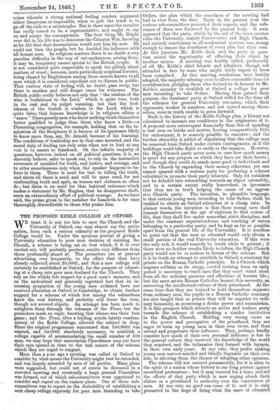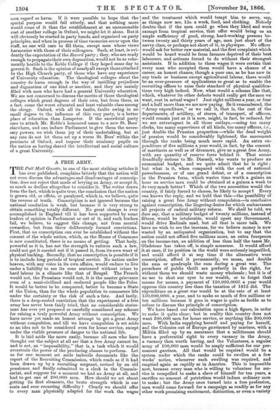THE' PROPOSED KEBLE COLLEGE AT OXFORD.
WTE trust, it, is not too late to save the Church and the V. University. of Oxford, one_ may almost say the entire nation,: from such a serious calamity as the proposed. Keble College would be. Under . the specious pretext of giving a University education to poor men desirous of entering the Church, a.. scheme is being set on foot which, if it is ever carried. out, will probably produce results very different from those professedly ,aimed at. The promoters are. at present advertising very frequently, to the effect that they have already collected about 30,0001., and that anew college will certainly.be established at ,Oxford, for the purpose of educat- ing at a cheap rate poor men, destined for the Church. They rely onthe widely .felt respect. for a good. man's memory, and on the. undoubted and generally regretted fact that an in- creasing, proportion of the young. men - ordained have not received education at Oxford or.Cambridge, to obtain further support for a scheme, of which few among the subscribers know the , real history, and probably still fewer the true, though not avowed objects. An attempt has been made to enlighten them.through the. columns, of the Times, but the promoters made no reply, knowing that silence was their best game ; ,and the Times, after.a leading article faintly condem- natory of. the Keble College, allowed. the subject to drop. Since the.original programme announced that 100,0001. was wanted, and 50,0004 absolutely. necessary, to establish a college.. capable. of, accommodating the small number of 100 Men, we may hope that uneeetarian Churchmen may yet have their eyes opened in time, to, the real, natxue of the scheme which they are urged to support. More than a year ago a .meeting was called at Oxford to consider. by. what means the Univeraity might best be extended, and was.largely attended by men of all parties. Many plans were suggested, but could not of course be, discussed in a. crowded meeting, and eventually a large general. Committee was formed, out of which soliTnonamittees were appointed to consider and report on the various plans. One of these sub- committees was to report on the .desirability of. establishing a new cheap college. expressly. for ;poor men. intending to take Orders, the plan which the convokers of the meeting had had in view from the first. Early in the present year the various sub-committees presented their reports, and the sub- stance of them was discussed by the general body. It soon appeared that the party, which by the aid of the town curates rules the University, mainly Conservative and High Church, and entirely reactionary in all academical matters, was strong enough to ensure the overthrow of every plan but their own. At this juncture Mr. Keble died, and the party in ques- tion seized the opportunity of effecting their object by another means. A meeting was hastily called, professedly of all Mr. Keble's chief friends and admirers, though not attended, in fact by some who might fairly expect to have been consulted. At this meeting resolutions were hastily adopted, the majority refusing even to allow reasonable time for consideration, pledging those who desired to do honour to Mr. Keble's memory to establish at Oxford a college for poor men intending to take Orders. Having thus gained their purpose, the dominant party at Oxford stifled for the time all the schemes for general University extension, which their opponents, weaker in numbers and not agreed among them-, selves, were in truth unable to press forward.
Such is the history of the Keble College plan, a history not calculated to increase our confidence in the originators of it. A proposal more extravagant financially than this of spending, a vast sum on bricks and mortar, leaving comparatively little for endowment, it is scarcely possible to conceive ; and the further absurdity is added of stipulating that the college may be removed from Oxford under certain contingencies, as if the buildings could take flight as easily as the inmates. However, the High Church party never seem to care how much money is spent for any purpose on which they have set their hearts ; and though they could do much more good to individuals and to the Church by expending their money otherwise, yet one cannot quarrel with a zealous party for preferring a scheme calculated, to promote their party interests. Only outsiders not be deluded into subscribing towards an object ostensibly, and to a certain extent really benevolent, in ignorance that they are in truth helping the cause of an aggres- sive Church party.. The intention, in plausible language, is that certain young men, intending to take Orders, shall be enabled to obtain an Oxford education at a cheap, rate.. In plainer words, the intention is that these young men shall commit themselves at the age of eighteen to that course of life, that they shall live under somewhat strict discipline, and under the constant superintendence and teaching of tutors belonging to a particular party, and be hept as. far as possible apart from the general life of the University. It is needless to point out that the men so educated would only obtain a. small portion of the real University education. If this were the only evil, it would scarcely be worth while to protest i • if there were no further results, likely to follow, the High Churcli party would not be so zealous in favour of the scheme. BO, it is in truth an attempt to establish in Oxford, a seminary for, priests on the Roman. Catholic principle. In a Church which imposes celibacy on its clergy, careful training from an early period is necessary to teach men that they must stand aloof from all the ordinary passions and affections of human life ; but the most astute Roman Catholics lament this necessity, as; narrowing the intellectual culture of their priesthood. At the, same time that they are trained to hold themselves separate from ordinary men, the pupils in a Roman Catholic seminary are also taught that as priests they will be superior to ordi- nary humanity, as possessing a divine power and commission. It is this prospect which attracts an active and zealous party towards the scheme of establishing a similar institution in the English Church. Holding very strong views as to the power and prerogative of the priesthood, they are eager to train up young men in their own views, and thus extend and perpetuate their influence. They, perhaps, hardly consider how much of their own personal influence is due to the general culture they received, the knowledge of the world they acquired, and the intimacies they formed with laymen, in their own early years. At any rate, they prefer making young men narrow-minded and blindly dogmatic on their own side, to allowing them the chance of adopting other opinions. The scheme will not succeed permanently, for it is alien to the spirit of, a nation whose history is one long protest against sacerdotal pretensions ; but it may succeed for a time, and aid the efforts of that party which is now urging afresh their claims as a priesthood to authority over the consciences of men. At any rate, no good can come of it and it is only promoted in the hope of doing what the mass of educated men regard as harm. If it were possible to hope that the special purpose would fail utterly, and that nothing more would come of it than the establishment at an unreasonable cost of another college in Oxford, we might let it alone. But it will obviously be started in party hands, and organized on party principles, and when in process of time vacancies occur upon the staff, no one will care to fill them, except men whose views harmonize with those of their colleagues. Such, at least, is evi- dently the expectation of the Record party ; they, who are ready enough to propagate their own dogmatism, would not be so vehe- mently hostile to the Keble College if they hoped some day to govern it. Such is the opinion of nearlyall except thoseattached to the High Church party, of those who have any experience of University education. The theological colleges about the country do harm enough in the way of instilling prejudices and dogmatism of one kind or another, and they are mainly filled with men who have had a general University education. We are not concerned to discuss the merits of those theological colleges which grant degrees of their own, but from them, as a fact, come the worst educated and least valuable class among the clergy. Oxford, with all its faults, faults owing in no small degree to the influence of this very party, is a better place of education than Lampeter. If the sacerdotal party care to attach Mr. Keble's honoured name to a new St. Bees' elsewhere, and can induce Parliament to give them the neces- sary powers, we wish them joy of their undertaking, but at any rate do not let them set up a worse St. Bees' within the precincts of Oxford, and impose their seminary pupils on the nation as having shared the intellectual and social culture of a great University.































 Previous page
Previous page